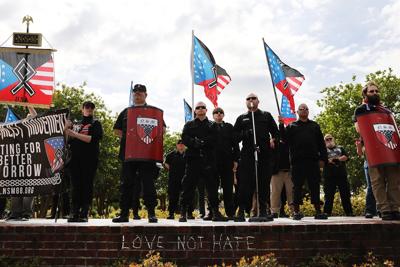OTTAWA—The Liberal government is weighing the criminalization of displaying terror and hate symbols, a potentially precedent-setting move in Canada that has prompted concerns about civil liberties.
It’s not yet clear if a possible ban would focus on specific symbols, like the swastika, or if it would broadly cover any symbols related to designated terror groups. And no final decision has yet been made on whether to go through with the Criminal Code reforms, which were being mulled by the Trudeau government prior to Prime Minister Mark Carney’s ascent to the Liberal leadership and his victory in the spring election, according to a transition  to the minister of justice from March 2025 that was made public last week.
During that campaign, Carney’s Liberals, who are now preparing to introduce a crime bill this fall, committed to bail reforms, the criminalization of “obstruction” and “intimidation” outside of places of worship and other community spaces, among other things.
Criminalizing hate and terror symbols, however, was not in the Liberal platform, even though it has been requested repeatedly by Jewish groups in Canada.
In a statement to the Star, the Department of Justice confirmed the matter was still under consideration as the government looks at options for tackling a rising number of hate crimes, but it did not indicate what direction it was leaning towards.
“The Government of Canada takes the use of any hate symbols very seriously and remains committed to protecting everyone in Canada from hate and discrimination in all its forms,” spokesperson Ian McLeod said in a statement.
“This work is ongoing. Although no final decisions have been made regarding the criminalization of any specific symbols, we continue to consult with officials and stakeholders to ensure our approach reflects our commitment to safety and inclusivity.”
Canada’s Criminal Code already has provisions against “hate propaganda,” including advocating for genocide, incitement of hatred and “wilful” promotion of hatred or antisemitism, but the display of terror or hate symbols is not outlawed explicitly.
The prospect of legislation to crack down on those symbols, however, has prompted questions about whether it might restrict freedom of expression, including in peaceful protests or artwork, for example.
The swastika is commonly associated with Nazi Germany’s antisemitic and racist violence, and is often used by far-right, white supremacist and other ideologically motivated extremist groups who have been in Canada. Meanwhile, at pro-Palestinian demonstrations against the war in Gaza, there have been some instances of protesters holding signs comparing Israel’s treatment of Palestinians to that of Nazi Germany’s towards Jews, prompting rebukes from some Jewish and pro-Israel groups. There have also been documented instances of protesters waving the flags of Hamas and other militant groups that are on Canada’s designated terror list.
In 2024, a man was arrested and charged in ÎÚÑ»´«Ã½ after waving the flag of the Popular Front for the Liberation of Palestine, but the case was  because there was “no reasonable prospect of conviction.”
“We’re hopeful,” said Richard Robertson, the director of research and advocacy at B’nai Brith Canada, which has been calling for a ban on the swastika and the criminalization of displaying flags, emblems and symbols related to designated terror groups. “Any efforts or considerations are welcome at this point.”
Shane MartÃnez, a human rights lawyer who represented the ÎÚÑ»´«Ã½ protester, said such a move would be a political and hypocritical attack on pro-Palestine demonstrators and predicted it would immediately face legal challenges.
“At best, it’s misguided, and at worst, it is an intentional effort to silence people, knowing that it violates their Charter rights,” MartÃnez said.
The head of ÎÚÑ»´«Ã½’s police union said such legislation could give officers more clarity when policing protests, but said it should be accompanied by training.
“With the protests that have been going on, there’s a lot of pressure and expectation on our members to be seizing certain items, if it’s flags or other symbols that may be related to hate or terror organizations,” said Clayton Campbell, the president of the ÎÚÑ»´«Ã½ Police Association. “And for our members, it’s challenging as they can be confusing, right? Like, one flag, slightly adjusted may not be a terror symbol, may not be a hate flag.
“Anything that could help them do their jobs better would be good,” he said.
Error! Sorry, there was an error processing your request.
There was a problem with the recaptcha. Please try again.
You may unsubscribe at any time. By signing up, you agree to our and . This site is protected by reCAPTCHA and the Google and apply.
Want more of the latest from us? Sign up for more at our newsletter page.


























